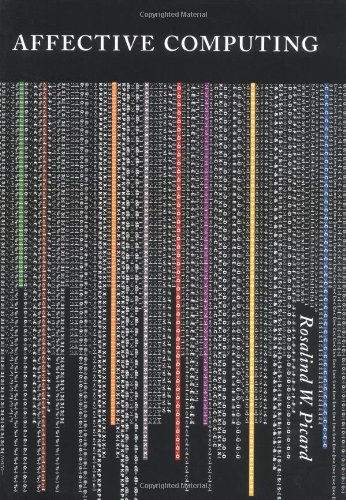

Edition: 1st
Release: 2000-07-31
Publisher: The MIT Press
Binding: Paperback
ISBN/ASIN: 0262661152

Affective Computing
The latest scientific findings indicate that emotions play an essential role in decision making, perception, learning, and more--that is, they influence the very mechanisms of rational thinking. Free download Affective Computing books collection in PDF, EPUB, FB2, MOBI, and TXT formats. Not only too much, but too little emotion can impair decision making. According to Rosalind Picard, if we want computers to be genuinely intelligent and to interact naturally with us, we must give computers the ability to recognize, understand, even to have and express emotions.Part 1 of this book provides the intellectual framework for affective computing. It includes background on human emotions, requirements for emotionally intelligent computers, applications of affective computing, and moral and social questions raised by the technology. Best deals ebooks download Affective Computing on amazon.Part 2 discusses the design and construction of affective computers. Although this material is more technical than that in Part 1, the author has kept it less technical than typical scientific publications in order to make it accessible to newcomers. Topics in Part 2 include signal-based representations of emotions, human affect recognition as a pattern recognition and learning problem, recent and ongoing efforts to build models of emotion for synthesizing emotions in computers, and the new application area of affective wearable computers.As a scientist who works in computer development, Rosalind Picard is accustomed to working with what is rational and logical. But in her research on how to enable computers to better perceive the world, she discovered something surprising: In the human brain, a critical part of our ability to see and perceive is not logical, but emotional. Therefore, for computers to have some of the advanced abilities we desire, it may be necessary that they comprehend and, in some cases, feel emotions. Affective Computing isn't about making PCs that get grumpy when you enter repeated errors or that may react out of fear like 2001's Hal or The Terminator's SkyNet; it's about incorporating emotional competencies that allow computers to better perform their jobs. On the simplest level, this may mean installing sensors and programming that simply allow a computerized system to determine the emotional state of its user and respond accordingly. The book also mentions options such as the ability to include emotional content in computer-moderated communications that work far better than today's emoticons. The first part of Picard's book introduces the theoretical foundations and principles of affective computing in a thoroughly nontechnical manner. She explores why feelings may soon become part of computing technology and discusses the advantages and the concerns of such a development. Picard raises a number of ethical issues, including the potential for misleading users into thinking they're communicating with another human and the need to incorporate responsible behavior into affective computer programming, along the lines of Isaac Asimov's famous three laws of robotics. In part 2, the book becomes more technical, although it is still within the comprehension of most laypeople. This section discusses how computers might be designed, constructed, and programmed to allow them to recognize, express, and even have emotions. This book is a solid scientific introduction to a subject that seems like a doorway into science fiction. Affective Computing with free ebook downloads available via rapidshare, mediafire, 4shared, and hotfile.
Download Affective Computing
